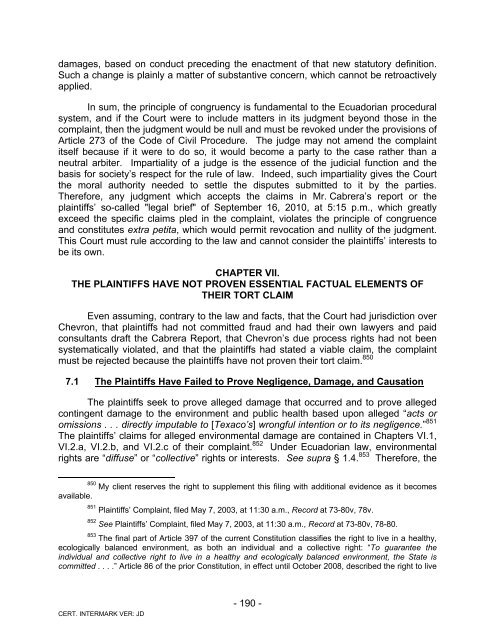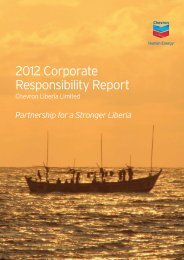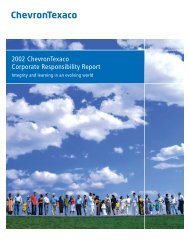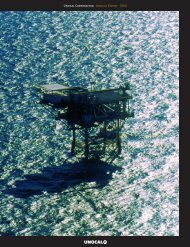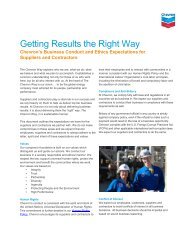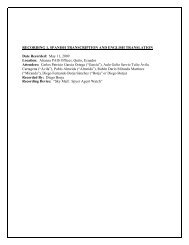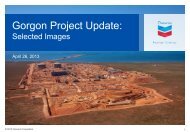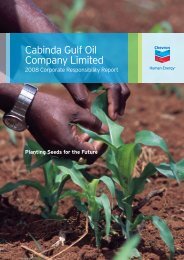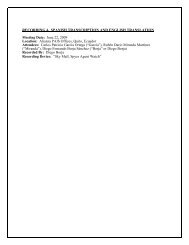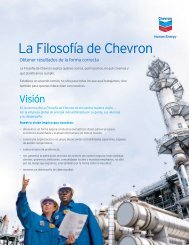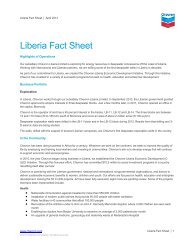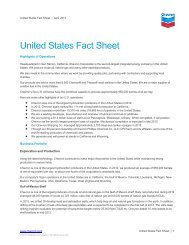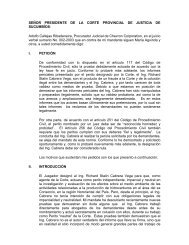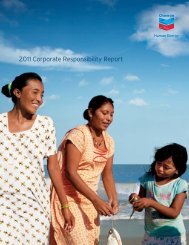-i- TO THE SUBROGATE PRESIDENT OF THE ... - Chevron
-i- TO THE SUBROGATE PRESIDENT OF THE ... - Chevron
-i- TO THE SUBROGATE PRESIDENT OF THE ... - Chevron
Create successful ePaper yourself
Turn your PDF publications into a flip-book with our unique Google optimized e-Paper software.
damages, based on conduct preceding the enactment of that new statutory definition.<br />
Such a change is plainly a matter of substantive concern, which cannot be retroactively<br />
applied.<br />
In sum, the principle of congruency is fundamental to the Ecuadorian procedural<br />
system, and if the Court were to include matters in its judgment beyond those in the<br />
complaint, then the judgment would be null and must be revoked under the provisions of<br />
Article 273 of the Code of Civil Procedure. The judge may not amend the complaint<br />
itself because if it were to do so, it would become a party to the case rather than a<br />
neutral arbiter. Impartiality of a judge is the essence of the judicial function and the<br />
basis for society’s respect for the rule of law. Indeed, such impartiality gives the Court<br />
the moral authority needed to settle the disputes submitted to it by the parties.<br />
Therefore, any judgment which accepts the claims in Mr. Cabrera’s report or the<br />
plaintiffs’ so-called "legal brief" of September 16, 2010, at 5:15 p.m., which greatly<br />
exceed the specific claims pled in the complaint, violates the principle of congruence<br />
and constitutes extra petita, which would permit revocation and nullity of the judgment.<br />
This Court must rule according to the law and cannot consider the plaintiffs’ interests to<br />
be its own.<br />
CHAPTER VII.<br />
<strong>THE</strong> PLAINTIFFS HAVE NOT PROVEN ESSENTIAL FACTUAL ELEMENTS <strong>OF</strong><br />
<strong>THE</strong>IR <strong>TO</strong>RT CLAIM<br />
Even assuming, contrary to the law and facts, that the Court had jurisdiction over<br />
<strong>Chevron</strong>, that plaintiffs had not committed fraud and had their own lawyers and paid<br />
consultants draft the Cabrera Report, that <strong>Chevron</strong>’s due process rights had not been<br />
systematically violated, and that the plaintiffs had stated a viable claim, the complaint<br />
must be rejected because the plaintiffs have not proven their tort claim. 850<br />
7.1 The Plaintiffs Have Failed to Prove Negligence, Damage, and Causation<br />
The plaintiffs seek to prove alleged damage that occurred and to prove alleged<br />
contingent damage to the environment and public health based upon alleged “acts or<br />
omissions . . . directly imputable to [Texaco’s] wrongful intention or to its negligence.” 851<br />
The plaintiffs’ claims for alleged environmental damage are contained in Chapters VI.1,<br />
VI.2.a, VI.2.b, and VI.2.c of their complaint. 852 Under Ecuadorian law, environmental<br />
rights are “diffuse” or “collective” rights or interests. See supra § 1.4. 853 Therefore, the<br />
850 My client reserves the right to supplement this filing with additional evidence as it becomes<br />
available.<br />
851 Plaintiffs’ Complaint, filed May 7, 2003, at 11:30 a.m., Record at 73-80v, 78v.<br />
852 See Plaintiffs’ Complaint, filed May 7, 2003, at 11:30 a.m., Record at 73-80v, 78-80.<br />
853 The final part of Article 397 of the current Constitution classifies the right to live in a healthy,<br />
ecologically balanced environment, as both an individual and a collective right: “To guarantee the<br />
individual and collective right to live in a healthy and ecologically balanced environment, the State is<br />
committed . . . .” Article 86 of the prior Constitution, in effect until October 2008, described the right to live<br />
CERT. INTERMARK VER: JD<br />
- 190 -


